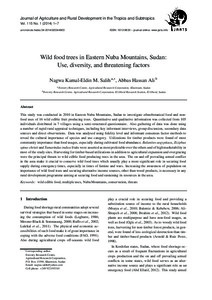| dc.date.accessioned | 2014-08-25T10:19:49Z | |
| dc.date.available | 2014-08-25T10:19:49Z | |
| dc.date.issued | 2014 | |
| dc.identifier.issn | 1612-9830 | |
| dc.identifier.uri | urn:nbn:de:hebis:34-2014020344903 | |
| dc.identifier.uri | http://hdl.handle.net/123456789/2014020344903 | |
| dc.language.iso | eng | |
| dc.publisher | Kassel University Press | ger |
| dc.rights | Urheberrechtlich geschützt | |
| dc.rights.uri | https://rightsstatements.org/page/InC/1.0/ | |
| dc.subject | wild edible food | eng |
| dc.subject | multiple uses | eng |
| dc.subject | Nuba Mountains | eng |
| dc.subject | conservation | eng |
| dc.subject | threats | eng |
| dc.subject.ddc | 630 | |
| dc.title | Wild food trees in Eastern Nuba Mountains, Sudan: Use diversity and threatening factors | eng |
| dc.type | Aufsatz | |
| dcterms.abstract | This study was conducted in 2010 in Eastern Nuba Mountains, Sudan to investigate ethnobotanical food and non-food uses of 16 wild edible fruit producing trees. Quantitative and qualitative information was collected from 105 individuals distributed in 7 villages using a semi-structured questionnaire. Also gathering of data was done using a number of rapid rural appraisal techniques, including key informant interviews, group discussion, secondary data sources and direct observations. Data was analysed using fidelity level and informant consensus factor methods to reveal the cultural importance of species and use category. Utilizations for timber products were found of most community importance than food usages, especially during cultivated food abundance. Balanites aegyptiaca, Ziziphus spina-christi and Tamarindus indica fruits were asserted as most preferable over the others and of high marketability in most of the study sites. Harvesting for timber-based utilizations in addition to agricultural expansion and overgrazing were the principal threats to wild edible food producing trees in the area. The on and off prevailing armed conflict in the area make it crucial to conserve wild food trees which usually play a more significant role in securing food supply during emergency times, especially in times of famine and wars. Increasing the awareness of population on importance of wild food trees and securing alternative income sources, other than wood products, is necessary in any rural development programme aiming at securing food and sustaining its resources in the area. | eng |
| dcterms.accessRights | open access | |
| dcterms.bibliographicCitation | In: Journal of Agriculture and Rural Development in the Tropics and Subtropics. Kassel : Kassel University Press. - Vol. 115, No. 1 (2014), S. 1-7 | |
| dcterms.creator | Salih, Nagwa Kamal-Eldin M. | |
| dcterms.creator | Ali, Abbas Hassan | |
| dc.description.everything | Gedruckte Ausg. im Verlag Kassel Univ. Press (www.upress.uni-kassel.de) erschienen. | ger |

